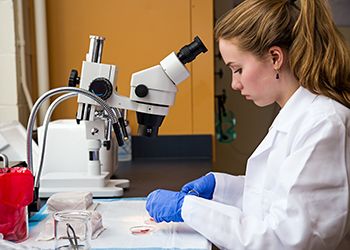Associate Professor/Associate Chair for Research
Department of Biomedical Sciences
Dr. Gilmartin received her Ph.D. in Neuroscience from the Penn State College of Medicine and completed her post-doctoral training with Dr. Fred Helmstetter at the University of Wisconsin-Milwaukee. At Marquette, Dr. Gilmartin and her team study the brain circuitry underlying fear learning and memory, using a combination of in vivo electrophysiology, calcium imaging, and optogenetics. Determining the similarities and differences in how males and females learn and store fear memories will provide insight into what makes some individuals more or less susceptible to developing fear and anxiety disorders.
Education
- B.S. 2000, University of Michigan
- Ph.D. 2007, Pennsylvania State University College of Medicine
- Postdoctoral Research Fellow, 2007-2012, University of Wisconsin-Milwaukee
Courses Taught
Undergraduate:
- BISC 4850, Systems Neuroscience
- BISC 4851/4851H, Advanced Systems Neuroscience
Graduate:
- BISC/NRSC 5850, Systems Neuroscience
- BIOL 8955, Conditioning and Learning
- NRSC 8002, Neuroscience Foundations II
Research Interests
Research in the Gilmartin Lab
Memory is central to adaptive behavior. Healthy emotional learning allows us to predict and avoid danger and approach reward and safety. A distributed network of cortical and subcortical brain areas participate in successful memory formation and dysfunction in these circuits leads to maladaptive behavior observed in a number of mental health disorders, including post-traumatic stress disorder (PTSD) and other anxiety disorders, schizophrenia, and addiction. Our work seeks to determine how prefrontal cortex, hippocampus, and amygdala functionally interact to form, store, and retrieve emotional memory.
Additional Information
Dr. Gilmartin's research page
Dr. Gilmartin's lab page



